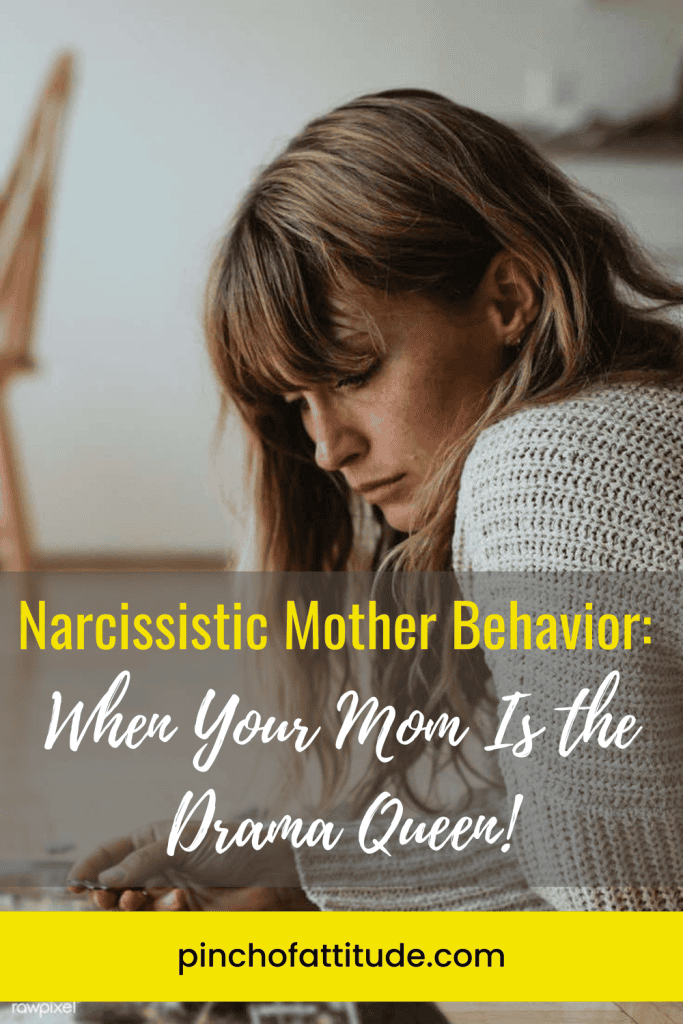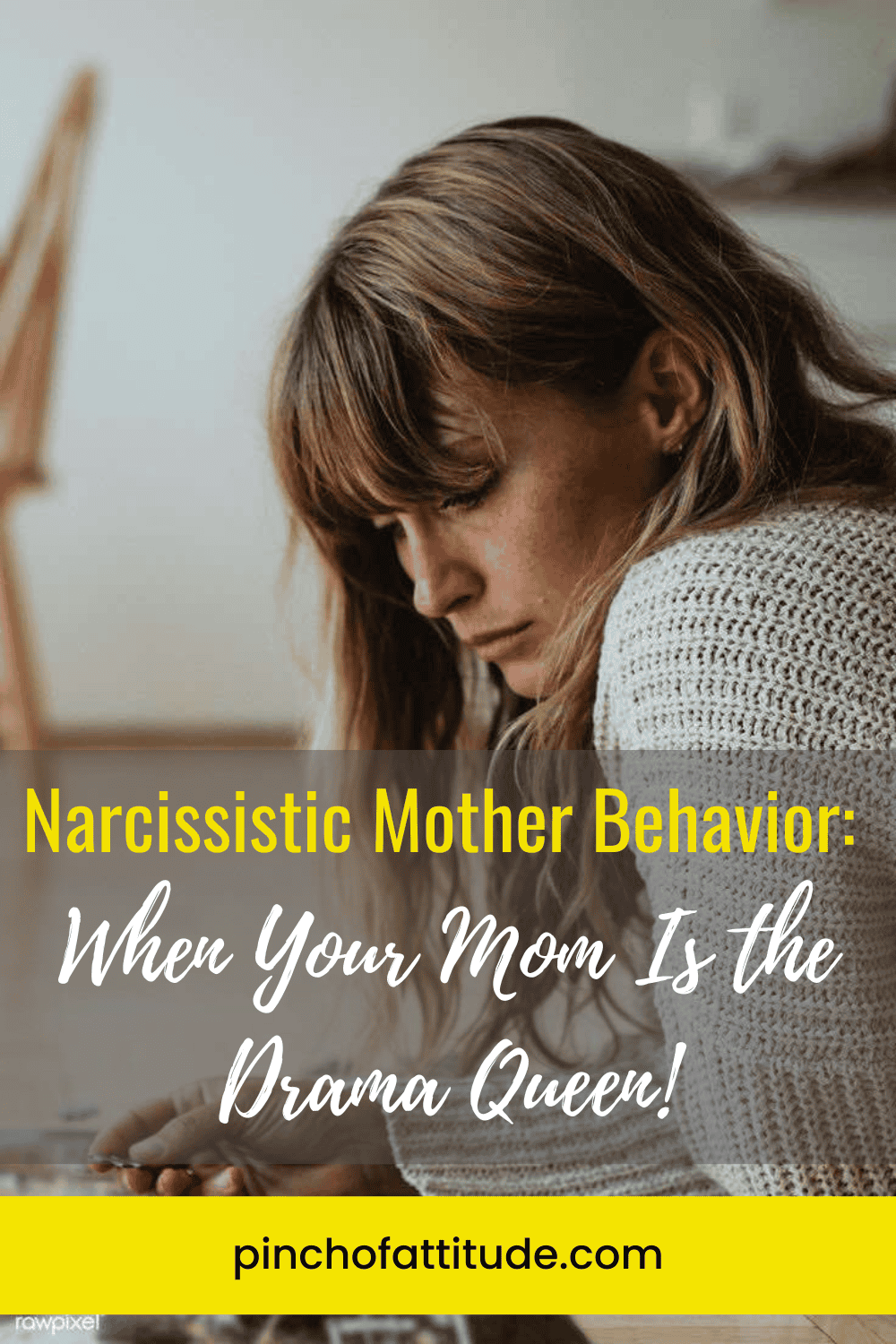Growing up with a narcissistic mother is an emotional labyrinth most would rather avoid.
But I know this terrain all too well, having learned how to deal with a narcissist mother from a young age.
It’s a journey that taught me resilience, self-discovery, and a unique set of skills to outsmart her manipulations.
If you think you’re also suffering from narcissistic abuse or suspect your mother is a narcissist, I’ll share the valuable lessons I’ve learned along the way to help you deal with one.
From creating a support group to cultivating self-confidence, my aim is to help you navigate the complexities of your relationship with your mother.
- Recognizing and understanding the manipulative tactics a narcissistic mother may use, such as guilt trips will protect you from falling into her toxic trap.
- Children of narcissistic mothers can develop emotional awareness through mindfulness and journaling.
- To cope with a narcissistic mother you must communicate your boundaries calmly and enforce consequences when necessary.
17 Effective Tips on How to Deal With a Narcissist Mother?

Dealing with a narcissistic mother is a challenge like no other, and my own life’s journey has been a testament to that.
Overcoming her manipulations and emotional turbulence required a blend of patience, strength, and an unwavering commitment to my own well-being.
The strategies below have not only helped me survive the storm but also thrive in its aftermath.
So, whether you’re seeking to establish boundaries or find support, these insights will guide you toward a path of empowerment and self-discovery in the face of maternal narcissism.
1. Identify Her Manipulative Tactics
To learn how to deal with narcissist mother, you first have to identify her manipulative tactics and by recognizing the types of narcissistic mothers can further aid you in understanding her toxic ways of getting you to do her dirty deeds.
For me, this meant recognizing that my mother thrived on controlling situations and those around her.
You see, narcissistic mothers often use guilt trips, emotional blackmail, and gaslighting to keep their children under their influence.
Understanding my mom’s tactics was an eye-opening experience.
It allowed me to detach emotionally from her manipulation, recognizing that her behavior was a reflection of her insecurities, not my worth.
Identifying these strategies gave me the upper hand in not falling prey to her whims and empowered me to set boundaries and maintain my sense of self amidst the chaos.

2. Train Your Emotional Awareness
Growing up with my mother’s emotional rollercoaster, I realized the importance of mastering my own emotions.
It allowed me to distinguish between her manipulative outbursts and my genuine thoughts and feelings.
Practicing mindfulness and journaling helped me pinpoint my feelings and reactions, providing a shield against her emotional manipulation.
As I became more attuned to my emotions, I could respond rationally rather than reactively.
This emotional intelligence became a powerful tool, enabling me to maintain my own mental stability and clarity in the face of her constant emotional turbulence.

3. Stay Calm and Communicate Your Boundaries
I learned early on that reacting to my narcissistic mother’s outbursts with anger or frustration only escalated the situation.
Instead, maintaining a sense of inner peace allowed me to approach confrontations with clarity.
When deciding what to say to a narcissistic mother, I found that calmly and assertively expressing my boundaries was key.
By articulating my limits with unwavering confidence, I not only maintained control over my emotional well-being but also conveyed that I wouldn’t be manipulated or pushed beyond those boundaries.

4. Show Her Consequences When She Violates Your Boundaries
Another effective way to deal with a narcissistic mother is to show her the consequences of crossing your boundaries.
I discovered that simply setting boundaries wasn’t always enough. It required consistent follow-through.
When she violated my limits, I ensured she faced the agreed-upon consequences. This sent a clear message that I was serious about maintaining my boundaries.
It’s a tough step, as it often brings resistance and manipulation attempts. But standing firm was crucial in demonstrating that I wouldn’t tolerate her overstepping my limits.
Over time, this strategy played a pivotal role in fostering a more respectful dynamic and reinforcing the importance of boundaries in our relationship.

5. Don’t Let Your Attention Sway and Stay Focused
Maintaining focus and not allowing your attention to sway is a skill that will prove invaluable in how you handle a narcissistic person.
My own mother’s ability to shift conversations and manipulate emotions was astounding. Yet, I learned to stay grounded in my intentions and not get sidetracked.
When she attempted to divert the topic or provoke an emotional reaction, I stayed on course.
It required unwavering determination to stick to the matter at hand, not letting her distractions or emotional baiting get the best of me.
By doing so, I prevented her from gaining control over the narrative and maintained a sense of power and clarity in our interactions.

6. Use “I” Statements at All Times
I learned from therapy that using “I” statements consistently is a crucial skill for children of narcissistic parents.
Instead of pointing fingers or making accusatory statements, I learned to express my thoughts and feelings using phrases like “I feel” or “I need.”
This not only made my communication less confrontational but also helped me stay focused on my own experiences and needs, shifting the dynamics of our interactions.
In short, “I” statements conveyed my emotions while keeping the spotlight on my perspective.

7. Always Validate Her Feelings
Having a relationship with a person with narcissistic personality disorder can be emotionally draining, but one effective strategy I discovered was always validating their feelings.
It may sound counterintuitive, but acknowledging my mother’s emotions, even if they were often self-centered, contributed to a more constructive dynamic.
By recognizing her feelings, I didn’t fuel her insecurities or escalate conflicts. In turn, this approach safeguarded my self-esteem and allowed for more open communication.
It was a delicate balance, validating her feelings without compromising my boundaries, but it ultimately helped de-escalate tensions.
Doing this helps maintain a semblance of mutual respect between me and my mother, and we’re able to coexist more peacefully.

8. Try Your Best to Find Common Ground
Finding common ground with a narcissistic mother may be a formidable task, but it’s one I found essential.
Her narcissistic behavior often makes her children feel unheard and undervalued, which can profoundly impact their self-worth.
In my journey, I sought areas of shared interest or values, no matter how small, to establish a connection.
It wasn’t about changing her, but about finding a bridge to foster understanding.
This approach allowed for more peaceful interactions and provided moments where I felt acknowledged.
It’s a challenging process. But uncovering those shared elements can help bridge the emotional gap and, in some instances, restore a modicum of self-esteem.

9. Set Realistic Expectations
Setting realistic expectations was a pivotal step in my journey.
Spending even a short time with my narcissistic parent may come with the stark realization that her lack of empathy and self-centered behavior will not change.
I learned that my narcissistic mother is unable to give me the emotional support or understanding that I need to feel.
By accepting this limitation, I reduced the disappointment and frustration that often accompanied our interactions.
It allowed me to focus on my own mental health and wellness and seek alternative sources of support, knowing that I wouldn’t find all I needed within the confines of our relationship.

10. Let Her Know Your Limits
For years, I believed that asserting my limits would only invalidate my emotional needs or trigger more manipulation.
After all, of all the traits of a narcissistic mother, this was her specialty.
However, I soon realized that setting boundaries was a powerful tool to protect my well-being. While you may not change your mother, you can influence the dynamics of your interactions.
When you calmly and assertively communicate your boundaries, you signal that your emotional needs matter.
This approach can gradually lead to a more respectful and balanced relationship, even if it doesn’t completely transform your mother’s behavior.

11. Establish Emotional Distance

Growing up with a narcissistic mother, I quickly learned that establishing emotional distance was essential to effectively deal with her behavior.
Her constant need for control and manipulation took a toll on my emotional well-being. But by creating that space, both physically and emotionally, I gained room to breathe and think.
It allowed me to detach from her incessant need for validation and steer clear of her emotional rollercoaster.
This distance became my refuge, a place where I could protect my own peace of mind, rebuild my self-esteem, and gain the perspective needed to navigate the complexities of our relationship.

2. Separate Yourself From Her Behavior
Being raised by a mother with NPD meant I had to learn to separate myself from her behavior.
It’s a challenging process. I initially internalized her actions, believing they reflected on my worth.
It was only through therapy and professional help that I understood that her behavior was not a reflection of my value as a person.
Learning to detach emotionally from her actions allowed me to regain my sense of self-worth.
When I get support from friends, family, and professionals, I am able to navigate the complexities of living with a narcissistic mother and reinforce the importance of self-identity.

13. Create an Action Plan
Adult children of narcissistic parents often find it incredibly empowering to create an action plan for dealing with parental narcissism.
My journey to healing and resilience truly began when I formulated a structured approach to navigating my relationship with my mother.
Collaborating with a mental health professional was instrumental in this process.
Together, we identified triggers, outlined healthy boundaries, and established strategies to maintain emotional well-being.
This action plan became my roadmap for dealing with the complexities of a narcissistic parent.
It provided a sense of control and direction, enabling me to regain my self-identity and prioritize my mental health in the face of the challenges I encountered.

14. Prioritize Your Time and Energy
Prioritizing your time and energy when dealing with a mother with mental health conditions is important for maintaining your own well-being.
It’s an essential step I discovered in my journey.
Often, boundaries with your mother may be blurred, and her emotional demands can be relentless.
To protect my mental health, I realized I needed to be selective about where I invested my time and emotional energy.
I consciously chose to focus on activities, relationships, and self-care that nourished my spirit.
In turn, doing this allowed me to regain a sense of balance and purpose in life, despite her voice sometimes echoing in the background.
15. Connect With Others Who Have Similar Experiences
To cope with a parent who has NPD, it’s a good idea to connect to other children who have survived narcissistic parenting.
I found that a support group for children of narcissistic mothers provided a safe space to share my story, learn from others, and realize that I wasn’t alone in this challenging journey.
Hearing the stories of others who experienced similar circumstances offered validation, empathy, and practical insights.
It was within this community that I found the strength to persevere and implement strategies to regain my sense of self amidst the chaos.

16. Take Responsibility for Your Choices
Taking responsibility for your choices is a critical step in confronting a narcissistic parent. It’s something I learned through personal experience.
Narcissistic parents often manipulate me, but I realized that I could take charge of how I responded to their behavior.
While I couldn’t control their actions, I could control my reactions. This realization was empowering.
It allowed me to make conscious choices about how I engaged with my parent, enabling me to set boundaries, maintain my emotional well-being, and prioritize my self-identity.
It was a profound shift, transforming the dynamic of our relationship, and it served as a foundation for my own growth and resilience.

17. Maintain a Positive Perspective
Maintaining a positive perspective is crucial when you’ve been raised by a narcissist. It’s not about ignoring the challenges but rather focusing on the good in life.
I learned that it’s essential to focus on the good in life and cultivate gratitude.
In moments of distress, going low or no contact with your mother to protect your own peace of mind can help you see the bigger picture.
This positive outlook doesn’t negate the difficulties you face, but it can offer a counterbalance, reminding you of the joy and potential for personal growth beyond the shadows of a difficult relationship.
It’s a small yet powerful tool that can keep your spirits high amidst the storm.

Related Posts:
- 10 Strategies on How I Deal With My Narcissistic Elderly Mother: No More Games
- 13 Tips on How I Deal With My Narcissistic Mother Guilt Trip
- Types of Narcissistic Mothers: I Seek to Understand and Heal
- 13 Challenges I Had to Overcome While Growing Up With a Narcissistic Mother
- Cut Off Narcissistic Mother: How I Finally Cut Ties With Her After 30 Years of Hell
Frequently Asked Questions
How can you deal with your narcissistic mother’s manipulation?
You can deal with your narcissistic mother’s manipulation by identifying her manipulative tactics, like guilt trips and emotional blackmail, to protect yourself and maintain boundaries.
Why is emotional awareness important in dealing with narcissistic mothers?
By training your emotional awareness through mindfulness and journaling helps you respond rationally rather than reactively to your mother’s emotional manipulation.
How should you handle confrontations with a narcissistic mother?
You should remain calm and communicate your boundaries assertively to maintain control over your emotional well-being. This will help convey that you won’t be manipulated.
What should you do when your narcissistic mother violates your boundaries?
When your narcissistic mother violates your boundaries, you need to show her the consequences of crossing your boundaries. Be consistent in implementing them to reinforce the importance of boundaries in your relationship.
How can you maintain focus and not let your attention sway when dealing with your narcissistic mother?
To main your cool and focus, you need to pay attention to the specific issue at hand. Use reflective listening to acknowledge their emotions while calmly steering the conversation back to the topic.




